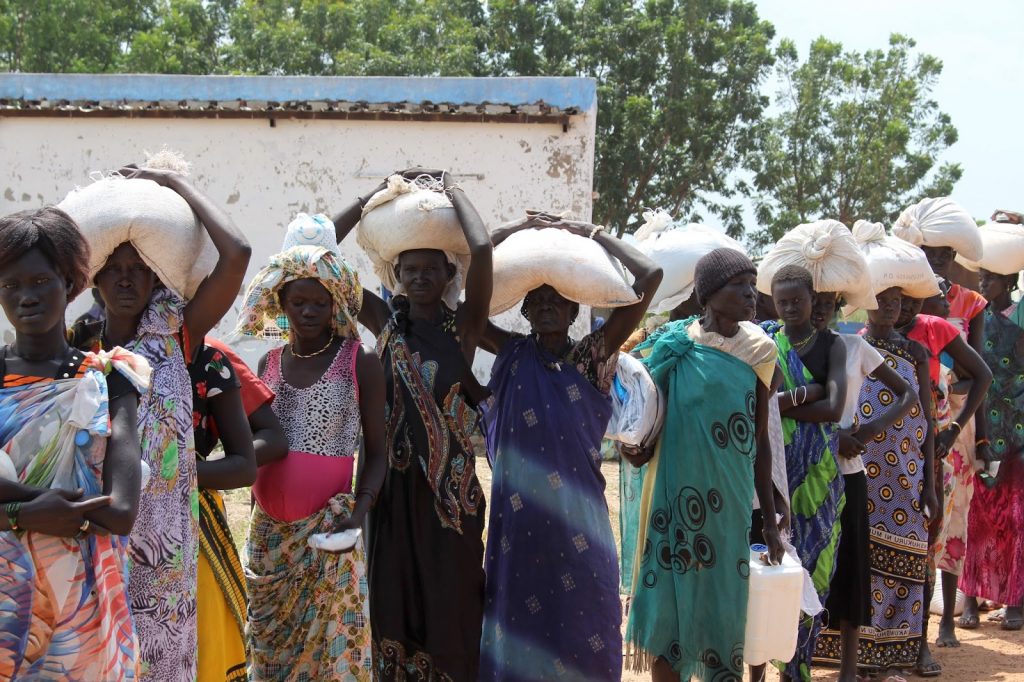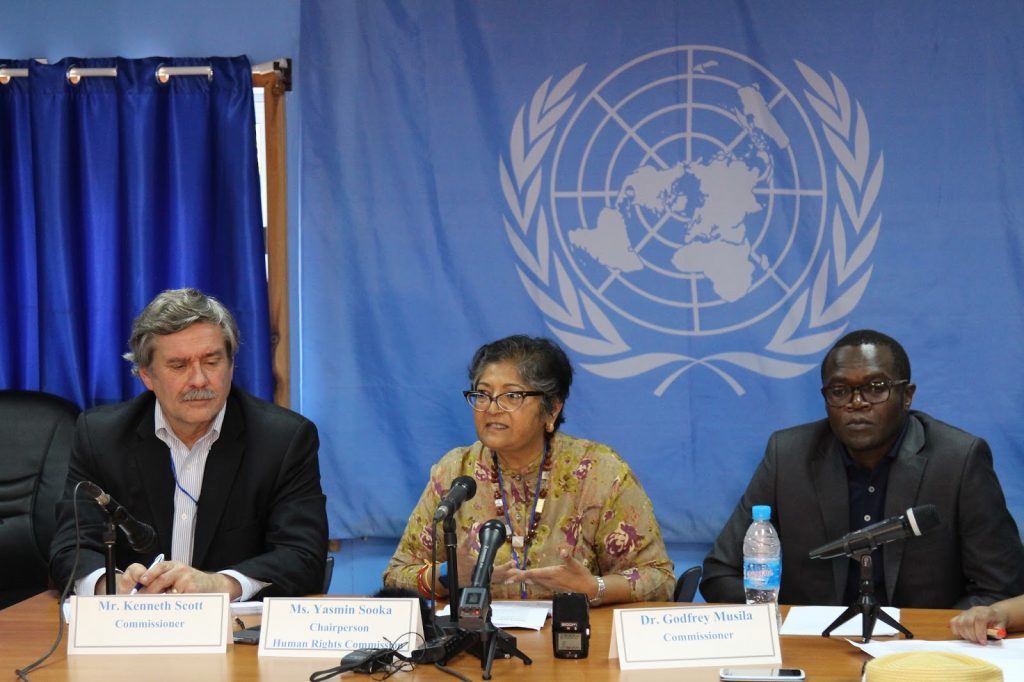Peter Louis
By
Peter Louis
Members from a United Nations commission on human rights for South Sudan on Wednesday gave press a briefing on their ten day vist to report on the country’s worsening condition.
Chairperson of the commission, Yasmin Sooka began: “I’d like to start by thanking all the victims of violations who spoke to us during this trip. Many had suffered unspeakable atrocities and yet somehow found it in themselves to recount their ordeals to us. I particularly want to thank several women gang raped in the violence in Juba in July who live in the Protection of Civilian camp number 3 who told us their stories even though they have yet to receive medical attention for the physical injuries they sustained, they’ve also yet to receive any kind of redress or legal access for the crimes that have been committed against them. It is completely unacceptable that South Sudanese mothers have to face rape daily to feed their hungry children but even worse that this huge international aid presence cannot reach these women afterwards and they are left feeling abandoned.
Across the country the victims we met exhibited fatigue and frustration with the constant visits from members of the international community. They told us “people from human rights” keep on coming, then go away, there is no feedback, and nothing changes. One woman in the Malakal Protection of Civilian site asked me why I wasted money on the air ticket if I was unable to solve their problems.
In Wau, an interviewee said, “we don’t need another report. We need the international community to do something.” All I could do is promise to speak out loudly about their plight and so did my colleagues in the areas that they visited as well.
I don’t need to tell a room full of journalists that there are unprecedented levels of violence and ethnic tension all over South Sudan. Any sense of national identity is crumbling and tribal identity taking over.
Given this country is home to 64 tribes this offers a multitude of fault lines along with this nation can fracture. I repeatedly heard of the desire for revenge and a process of concentrating people from one tribe – the Dinka – in the army and civil service. Coupled with that is the fact that forced and child recruitment is being conducted by all parties to the conflict and has even involved NGO staff being swept up and taken to military barracks and then later released after showing their identity cards. This renewed recruitment is an indicator that all parties are preparing for conflict.
My colleagues and I visited Protection of Civilian sites in Juba, Malakal, Wau and Bentiu. I am concerned there is no secondary education in these camps which are like small towns – that means a whole generation will be lost as a result of the years of enforced displacement. Young men could be seen loitering on street corners, playing cards and gambling and getting drunk. “These are people who are not seeing a future,” is how one aid worker summed it up to me.
Many camp residents described a pervading sense of insecurity – they said the camps were like prisons. One person said, “You hear bullets all the time and it’s not animals being killed – it’s human beings all the Time”.
Women in the camps recounted gruesome acts of sexual and gender based violence to us – describing being forcefully taken from their homes, dragged into bushes, and tied to trees and being raped in abandoned buildings.
Members of Human Rights commission give briefing to the journalists in Juba after their 10 days visit in South Sudan (Photo: Peter Louis)
On the day we visited Bentiu Protection of Civilian site we heard reports that three women had been raped outside the site that same day. We also met a woman from Leer raped by soldiers on the road to Bentiu some days before.
In Juba an elderly woman narrated her traumatic rape ordeal days after the cessation of fighting here in July. We heard how the woman had prevented her daughter from going out to search for food, believing her age meant she was not at risk of being raped. To her horror, she was ambushed, gang raped and left for dead and today cannot sit for long periods because of the untreated injuries.
Some women asked me why they are not invited to participate in the political process at a national level.
One asked why the chairperson of JMEC doesn’t transport them all to take part in discussions – and it’s a good question.
Throughout the country there is a total breakdown of law and order with hardly any formal courts of law in operation and in Unity State for example, even the traditional village mediation system run by tribal chiefs has ceased to function.
As one woman put it to me, “In South Sudan there is no law. What is here is the law of the jungle. Whoever is the most powerful dominates”.
The central issue raised with us again and again is that of land grabbing, in a situation where very few members of the Dinka tribe are being displaced. The overriding sentiment across the country is that those displaced are now willing to fight to regain their land. Many expect intensified fighting now the dry season is setting in.
Many victims expressed a desire for the alleged perpetrators of violations to be held accountable in the proposed hybrid court or even in an international court. They said it was not necessary to wait for peace before setting up such a justice mechanism. As you know part of our mandate is to look at he chapter five of the Peace Agreement and transitional justice issues and we will be producing a report for the UN Human Rights Council in Geneva for March next year addressing some of these questions.
I should also like to take this opportunity to raise the issue of freedom of expression. Across the board all journalists we spoke to felt themselves in peril. Journalists should be able to exercise their right to freedom of expression, including interviewing opposition figures and critics of the Government – acts that in themselves do not amount to incitement or hate speech. If the Government feels a media outlet has broken the law it should take those responsible to court, not threaten and harm reporters and arbitrarily close down media outlets.
Apart from the bravery of journalists in this country I should also like to pay tribute to local human rights defenders. It’s easy for us to fly in and hold press conferences but these are the people who risk their lives on a daily basis. I’d also like to mention the doctors and staff of the tiny clinic in Wau Shilluk I visited who had been forced to flee Malakal Town but continue to work without salaries in order to serve their people, this is the same for teachers who have been transferred because they belong to the wrong ethnic group. That’s true public service.
Several people told me they wouldn’t be alive today without the efforts of the United Nations and humanitarian agencies. I am concerned that the government authorities have abnegated their responsibility to provide even the most basic services for their citizens. The UN and its humanitarian partners have stepped into the void. They now risk facing a dilemma about speaking out strongly over rights violations for fear it could jeopardise humanitarian access, with the result that hundreds of thousands of people could be denied food and medical care.
We have said the international community has a responsibility to prevent mass killings and mass atrocities – as you know the UN Special Rapporteur on Genocide has issued a warning. As we see it, several of the indicators and enabling factors are there but that doesn’t of course mean it’s inevitable.
There are several steps that should be taken NOW to avert catastrophe – these are sanctions, asset freezes, an arms embargo, the immediate deployment of the 4000 strong protection force in South Sudan which should not be restricted to the capital alone.
Long term I would urge those who work with victims who are losing hope to keep on documenting the violations, but documenting is like your insurance policy, it may not be used now but in the future it can be used for accountability. If the crimes are not recorded that is the one sure way of ensuring those responsible get away with them. The figures of course for IDPs and refugees are startling, at this point South Sudan shares the privilege of being one in four countries that has more than one million outside of the country and of course it has more than three million people who have been displaced. That means in a country of twelve million people almost one in four people are either refugees, or they are in displacement camps. From what we have heard, 9300, teachers have left the country only one third has left. And figures suggest that about 60% of UN national staff have their families outside of the country.
These are not good figures, because what they speak to is a very disturbing indicator. You know at this point the economic instability in the country is a challenge; inflation has exceeded almost 900%. Usually when you have economic instability together with an indicator around dehumanization the question of localised conflicts and the question of ‘normalisation’ of serious crimes, the killings… these things don’t disturb us anymore because we hear them every day.
That kind of indifference is very dangerous and I would urge that both south Sudanese leadership, the international community including the African Union and IGAD really need to stop the war talk, the hate speech and they need to stop the violence in the country. People need to take away people’s arms and there needs to be an arms embargo, there needs to be targeted sanctions, and above all there needs to be accountability for the impunity which has become endemic in the country over the last few years.




No Comments Yet!
You can be first to comment this post!